Pregnancy and Heat Waves
Air Date: Week of June 24, 2022
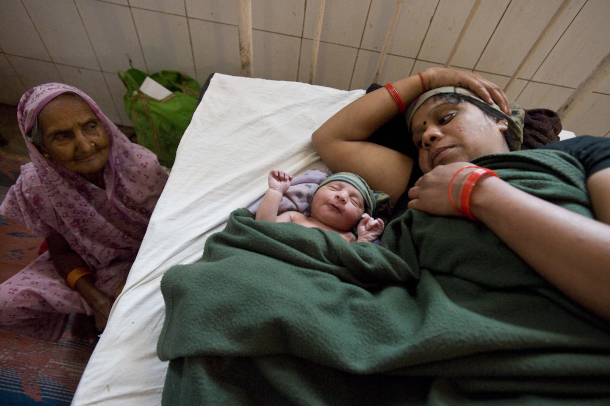
A mother and her newborn baby in Northern India, where temperatures reached a record-breaking 120 degrees Fahrenheit in the spring of 2022. (Photo: Nick Cunard, Department for International Development, Flickr, CC BY-NC-ND 2.0)
Extreme heat events such as India and Pakistan recently endured are among the deadliest impacts of climate change, and pregnant women and fetuses are among the most vulnerable to heat stress. Cecilia Sorensen, director of the Global Consortium on Climate and Health Education at Columbia University, joins Host Bobby Bascomb to discuss the research on how extreme heat is linked to complications of pregnancy including eclampsia, preterm birth and stillbirth.
Transcript
CURWOOD: It’s Living on Earth, I’m Steve Curwood.
BASCOMB: And I’m Bobby Bascomb
Heat waves are some of the deadliest and growing impacts of climate change and public health experts now attribute more than a third of heat-related deaths to climate disruption. And women bearing children are among the most vulnerable to heat stress and the polluted air that often comes with it. For pregnant women in parts of the United States and Europe, where heat waves struck this year even before the summer solstice, an estimated 90% of them could seek relief in air conditioning. But for pregnant women who had to endure the recent record-breaking heatwave in India and Pakistan, with temperatures of up to 122 degrees Fahrenheit, just 5 to 10% had access to air conditioning. Some complications in pregnancy are directly related to extreme heat. For details we turn now to Cecilia Sorensen, director of the Global Consortium on Climate and Health Education at Columbia University. Welcome to Living on Earth, Cecilia!
SORENSEN: Hello Bobby, it's great to be here today.
BASCOMB: Well, let's start with this acute example of a heat wave in India. It was more than 120 degrees this spring, their hottest May since they began keeping records. How did that heat affect pregnant people there? You know, what are some of the health concerns associated with extreme heat during pregnancy?
SORENSEN: That's a great question. We know that pregnant women who are exposed to heat can suffer higher rates of preterm deliveries, other birth complications like pre-eclampsia and eclampsia, and the newborns can have higher risks of complications in the prenatal period.
BASCOMB: I believe there's been, you know, dozens of studies looking at heat and maternal health, including an Australian study that found a 46% increase in stillbirths during heat waves. That's a shocking number. I mean, that study was a bit of an outlier from what I understand. Others found more on the order of a 5% increase for premature births and stillbirths for every one degree increase in temperature. In any case though, it seems clear that there's a very strong relationship here.
SORENSEN: Yeah, absolutely. And I think those studies are really important and really speak to the fact that, you know, our systems designed to protect women's health and protect public health during heat waves are incredibly variable around the world, right. So, we can see modest impacts in certain places and really high impacts in other places. But in general, the picture is incomplete. And we also know that, you know, the risk for pregnancy depends on the trimester that the woman is affected, right. And so, there's a lot more information that we need to understand when we're thinking about the individual vulnerability of a person being exposed to a heat wave.
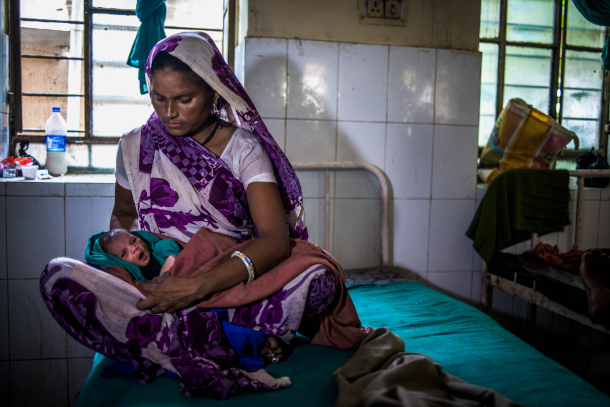
A mother with her newborn in a government hospital in Rajasthan. (Photo: Poulomi Basu, Children's Investment Fund Foundation, Flickr, CC BY-NC 2.0)
BASCOMB: I mean, you see pregnant women in the summer, and my heart just goes out to them. Being a mother of two, I know what that feels like. I cannot imagine what that feels like in 120-degree heat and unable to get cool.
SORENSEN: The scope of this is really hard to comprehend, I completely agree with you. And then when we think about heat, also being coupled with air pollution issues, which we know are rampant and are worsened by heat, you sort of have this double burden that occurs in many places with heat and with poor air quality, especially in relationship to burning of fossil fuels in urban areas, as well as wildfires, which we know also happen during the summers when we're seeing these heat waves.
BASCOMB: Well, that makes perfect sense. And I would think also, you know, so the poorest people that can't afford air conditioning might very well be also the people that can least afford to take time off when they are, you know, in stress during pregnancy. Do you see that as a problem also?
SORENSEN: Yeah, absolutely. I think especially with the informal labor sector that is very prevalent in India, that people are living on what they're making every day, you know, selling fruits and vegetables in the street or any other type of informal labor that they're engaged in, where if they are not going out and making money every day, that literally results in not being able to eat, and then we know that, you know, not having proper nutrition during pregnancy creates a whole other host of potential health outcomes for women.
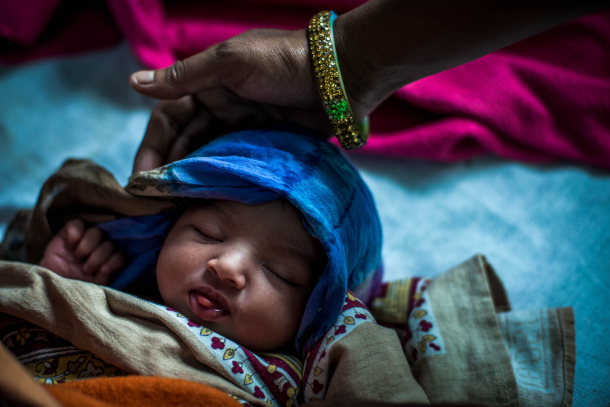
A newborn baby in a hospital in Sanganer, Jaipur. (Photo: Poulomi Basu, Children's Investment Fund Foundation, Flickr, CC BY-NC 2.0)
BASCOMB: Well, that's the thing too. I mean, extreme heat can be terrible for agriculture. And I understand that that's what's happened in India, the wheat harvest was really awful. As a result, as you said, you know, women need to eat properly during pregnancy. How concerned are you about these types of food shortages compounding complications for pregnant women?
SORENSEN: Yeah, I think that's a big deal. And again, I think the scope of this is a little bit unclear. You know, we see that during these extreme heat waves that the wheat harvest and other harvests were greatly affected. And so that's going to decrease just the availability of food. And because it's economically unviable for people to purchase food because the prices go up. We also can think about women as they are engaged in the agricultural sector. So for example, a lot of women are farmers, right. And so, they are also less likely to have crop insurance, and less likely to be able to have that buffer when their crops get destroyed. And so, there's some cultural and political issues that can compound that risk of food insecurity because it directly affects women's livelihoods and their ability to be reimbursed when there is large scale crop failure. And then also the cost of food making it inaccessible for women who are already experiencing impacts from poverty.
BASCOMB: Now, we've been talking about India here, but globally, temperatures are rising with climate change and scientists tell us to expect more increased temperatures in the future. Looking big picture worldwide, what other regions of the world are you most concerned about when it comes to maternal health and heat? Both now and looking forward?
SORENSEN: I'm concerned about it everywhere, Bobby. You know, I think that there is really a lack of awareness about the impacts of heat on women and especially on pregnant women. You know, this isn't something that we learn about in medical school or nursing school, we don't have a lot of public health warnings about it, and we don't see, you know, doctors counseling patients on this. And so that's one of my biggest concerns is that we don't have a great awareness of this among health professionals everywhere, but of course, there's pockets of vulnerability everywhere in the world, right. So, I think it's, it's hard to say that there's one region that I'm most worried about because we see pockets of vulnerability, you know, even in very high resource countries, especially where there's urban heat islands that really compound the impacts of heat.
BASCOMB: I would think, you know, parts of Africa might be very vulnerable, you know, East Africa is experiencing this terrible drought right now, which is a problem in its own right. But of course, you know, if you take a hot, dry place, add climate change, make it hotter and drier, it's easy to see how that could be very, very concerning.
SORENSEN: Oh, absolutely. And, you know, heat is just one of the exposures that we're thinking about, you're also thinking of the impacts of decreased water availability and how that can impact women's health in terms of, you know, their access to proper sanitation and hygiene, especially during vulnerable periods around pregnancy and menstruation, and then thinking about the food availability, right. So, it becomes a complicated sort of multi exposure issue very quickly. But as you mentioned, yes. I'm very concerned about places like Africa, where we're seeing large scale drought coupled with these rising heat waves.
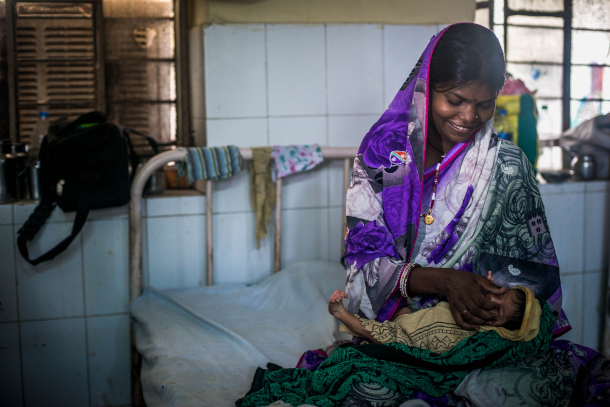
A mother with her second daughter in the District Hospital Karauli. (Photo: Poulomi Basu, Children's Investment Fund Foundation, Flickr, CC BY-NC 2.0)
BASCOMB: And what about increased risk for disease and infection for pregnant people during heat waves? From what I understand, pregnant women are more vulnerable to things like malaria and some diseases that they might otherwise be able to fight off?
SORENSEN: Well, we know that risks of water and foodborne diseases go up in the acute and sort of aftermath of heat waves. And so obviously, you know, getting any type of water or foodborne illness, when you're pregnant, or very young, that's not going to be great for your outcomes, it's gonna, you know, accelerate dehydration, cause stress, and all those things are not great for pregnancy. So, we see spikes in vector borne diseases, both in periods of drought and in periods of heavy precipitation. And that's what we're seeing with climate change is really an amplification of these two extremes, both of which, on the end of the spectrum can lead to higher risks of vector borne diseases like malaria, like dengue, which both have known pretty significant impacts on pregnant women.
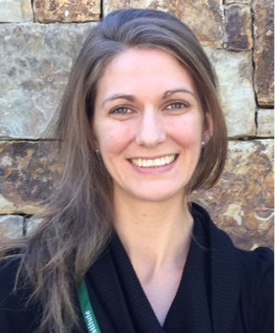
Cecilia Sorensen is an Associate Professor of Environmental Health Sciences at the Columbia University Medical Center. (Photo: Courtesy of Columbia University)
BASCOMB: So, we know that extreme heat is a big concern for maternal health. And we know that the problem is only going to get worse in the future with climate change. So, what can be done? You know, how can we safeguard the health of the most vulnerable people in our societies? You know, pregnant women and babies?
SORENSEN: That's a great question, Bobby. You know, I think there's many things we can do. I think, first, we really need to increase awareness of this issue among health professionals and not just OBGYNs, right. You know, they do see a lot of pregnant women, but we also see pregnant women in emergency departments and primary care clinics and subspecialty clinics. So, I think it's raising awareness throughout the health professional workforce to understand what the risks are to women. We also need to be thinking about public health messaging, right, when there's a heat wave, are we talking specifically about who's vulnerable, how they're vulnerable, and what they can do about it, right? So I think, to really get that going, we really need to be thinking about how we're educating health professionals about this issue so that they are aware, and they can do all those great things that public health and clinical medicine does when there is a threat to the health of a certain vulnerable group. I think we also need to ensure participation of women when we're talking about solutions, right? We can't assume that we know what's best in a community for how women can stay cool. We need to be thinking about how we can engage these vulnerable groups of women to ask them, what would be helpful for you to stay cool, right? There was some really interesting work done in northern Manhattan, where we know there's urban heat islands, and when you ask community members, you know, they have great solutions, like let's keep the pools open later, you know, let's install public water fountains. You know, really not high, economically intensive solutions but things that really help people at the community level.
BASCOMB: Cecilia Sorensen is the director of the Global Consortium on Climate and Health Education at Columbia University. Cecilia, thank you so much for your time today.
SORENSEN: Thank you so much for having me here.
Links
Learn more about the Global Consortium on Climate and Health Education
Learn more about the association between heat waves and perinatal health
Living on Earth wants to hear from you!
Living on Earth
62 Calef Highway, Suite 212
Lee, NH 03861
Telephone: 617-287-4121
E-mail: comments@loe.org
Newsletter [Click here]
Donate to Living on Earth!
Living on Earth is an independent media program and relies entirely on contributions from listeners and institutions supporting public service. Please donate now to preserve an independent environmental voice.
NewsletterLiving on Earth offers a weekly delivery of the show's rundown to your mailbox. Sign up for our newsletter today!
 Sailors For The Sea: Be the change you want to sea.
Sailors For The Sea: Be the change you want to sea.
 Creating positive outcomes for future generations.
Creating positive outcomes for future generations.
 Innovating to make the world a better, more sustainable place to live. Listen to the race to 9 billion
Innovating to make the world a better, more sustainable place to live. Listen to the race to 9 billion
 The Grantham Foundation for the Protection of the Environment: Committed to protecting and improving the health of the global environment.
The Grantham Foundation for the Protection of the Environment: Committed to protecting and improving the health of the global environment.
 Contribute to Living on Earth and receive, as our gift to you, an archival print of one of Mark Seth Lender's extraordinary wildlife photographs. Follow the link to see Mark's current collection of photographs.
Contribute to Living on Earth and receive, as our gift to you, an archival print of one of Mark Seth Lender's extraordinary wildlife photographs. Follow the link to see Mark's current collection of photographs.
 Buy a signed copy of Mark Seth Lender's book Smeagull the Seagull & support Living on Earth
Buy a signed copy of Mark Seth Lender's book Smeagull the Seagull & support Living on Earth

